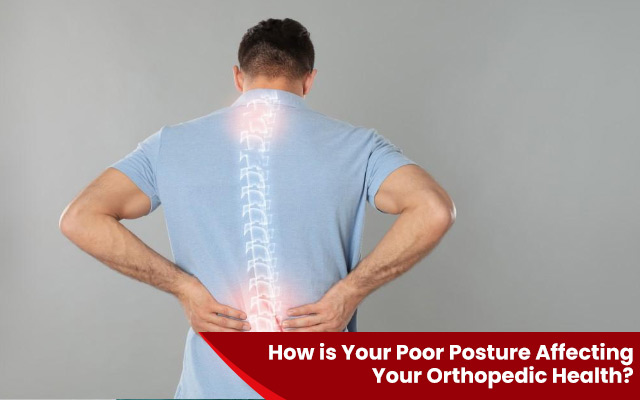You’ve probably heard “stand up straight!” more times than you can count. But have you ever wondered how your posture affects your orthopedic health?
Poor posture may seem like a minor issue, but it can lead to significant problems over time.
Let’s explore how bad posture impacts your body and why it’s important to correct it before it leads to long-term health problems.
How Posture Matters
Posture refers to how you hold your body while sitting, standing, or moving.
Good posture means your body is aligned properly, with bones, muscles, and joints functioning efficiently.
Poor posture, however, means misalignment, which causes added strain on muscles and joints. Over time, this can lead to discomfort and injury.
How Poor Posture Affects Your Orthopedic Health
Poor posture may seem like a simple issue, but it can have serious effects on your orthopedic health. Here’s how it can impact your body
Back and Neck Pain
The most common result of poor posture is chronic back and neck pain. Slouching or hunching puts pressure on your spine, leading to muscle strain, disc issues and even herniated discs.
Poor posture also strains the neck from constantly looking down or tilting forward.
Joint Problems
When your posture is off, certain joints bear more weight than they should. For example, slouching tilts your pelvis forward, increasing stress on your hip joints.
Over time, this can lead to joint pain and even osteoarthritis, which develops from long-term wear and tear.
Poor Circulation
Bad posture can restrict blood flow, especially to the lower body. Sitting or standing with poor posture affects the diaphragm, which reduces oxygen intake and impairs circulation.
This can cause swelling, varicose veins and muscle cramps.
Headaches
Misaligned posture can lead to tension headaches. When the neck and shoulders are strained from poor posture, it can result in headaches due to pressure on nerves in the neck.
Reduced Flexibility
Poor posture tightens and shortens muscles, reducing flexibility. This can lead to muscle stiffness, making it difficult to move freely or bend without discomfort.
Signs of Poor Posture
It’s easy to overlook poor posture, but there are key signs that can help you recognize the issue
- Regular back, neck, or shoulder pain.
- A forward-leaning posture when sitting or standing.
- Difficulty standing or sitting up straight.
- Frequent headaches.
- Tight or stiff muscles.
If you notice any of these signs, it’s important to take action before the problem worsens.
How to Improve Your Posture
Improving your posture starts with awareness. Here are some tips to help
- Strengthen your core: A strong core helps maintain proper alignment and supports your spine.
- Adjust your workstation: Ensure your desk, chair, and screen are at the right height to avoid slouching.
- Practice posture exercises: Stretching and strengthening exercises can help improve posture and relieve discomfort.
- Take breaks: If you’re sitting for long periods, stand up, stretch, and move around to relieve pressure.
When to See a Doctor
If poor posture is causing pain or affecting your daily life, it’s time to consult an expert.
Our orthopedic doctors in Mukundapur can help diagnose the problem and provide treatment options. Depending on the severity, treatments may include physical therapy, corrective exercises, or in rare cases, surgery.
Conclusion
Your posture plays a crucial role in your orthopedic health. Poor posture can lead to pain, joint problems, and long-term damage. If you’re dealing with posture-related issues or discomfort, don’t wait for the problem to worsen.
At Long Life Super Speciality Clinic, our experienced orthopedic doctors are ready to help you improve your posture and overall health.
Book your consultation with us today and take the first step towards a healthier & pain-free life.

